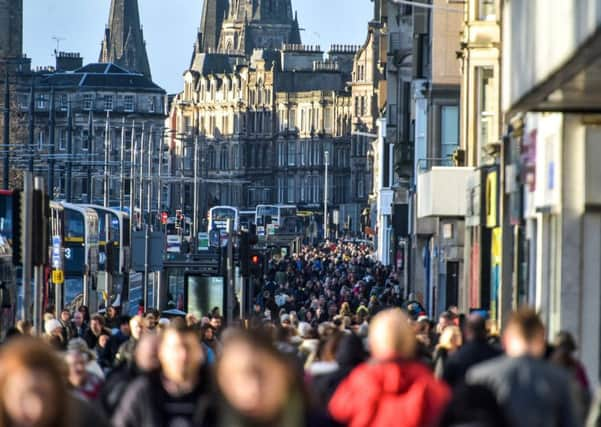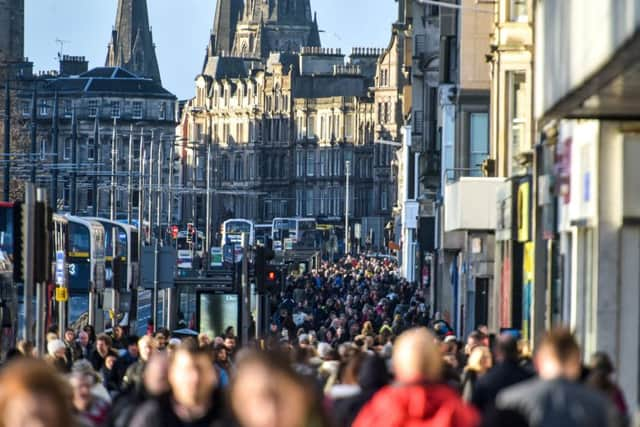Edinburgh should double population in 25 years, says top economist


Andrew Wilson, economist and former SNP MSP, said the city had two of the best economic development opportunities in the UK - the west of Edinburgh and the Waterfront.
And he argued an openness to migration put Edinburgh in a strong position for the future.
Advertisement
Hide AdAdvertisement
Hide AdThe seminar, the first in a series entitled Edinburgh Dialogues hosted by Edinburgh University’s Business School, focused on the Capital’s role as an international city after Brexit.
Mr Wilson said Scotland had to end inter-city rivalry and put Edinburgh at the heart of its national strategy.
Recalling a visit to America many years ago for Tartan Week, he said: “I remember being at an event in Washington and the provosts of both Edinburgh and Glasgow stood up to speak and slagged each other off and sat down to a bemused crowd of senators.
“For Scotland to succeed we need to stop thinking of Edinburgh as one of 32 local authorities and we need to regard it as our only Capital, our premier world city and the epicentre of national economic life and then we need to back Edinburgh to succeed unequivocally.”
Superb place to live


Advertisement
Hide AdAdvertisement
Hide AdHe said the city was a superb place to live, have a career and a family; and it was recognised as a globally important arts, culture and heritage location. “Taken together, that is the reputation of the city. All of the rest we might discuss in an economic strategy flows form those two points.”
But he said Scotland had an abnormally low rate of growth in its population. If Scotland had kept pace with the population growth of the UK since 1980 it would have about 5.9 million people. If it had kept pace with the small advanced economies in Europe it would have 6.5m.
“The urgent thing for Scotland and Edinburgh is to fix population - to get a bigger working age population, which means migration, and to get more people into the workforce, whether they’re old or women or dispossessed.”
Mr Wilson believes Scotland needs an overall increase in population and the Capital should lead it:
Advertisement
Hide AdAdvertisement
Hide Ad“I think we need to double the size of the city in the next generation. Gobsmacking thought, but why not? We need to do so while sustaining, recreating and stewarding the essence of what makes Edinburgh, Edinburgh. That is the challenge we face.”
‘Is it easy to get there’
He said the focus needed to be on “Is it easy to get here?” and “When you’re here is it great to be here?”
“These are central truths that trump all other clever ideas we might come up with.”
And he said there were big opportunities.
“We have two of the biggest economic development opportunities anywhere in the UK - the West of Edinburgh round through the university and beyond; and then the Waterfront, which when you think about it doesn’t exist - we don’t have a waterfront of any note. We’ve got one good cafe at Cramond, then nothing, then you get a big chip shop, then nothing, and then you’ve got a beach. That’s a huge upside opportunity.”
Invest in connectivity
Advertisement
Hide AdAdvertisement
Hide AdMr Wilson also called for investment in “connectivity” - both transport links and digital technology.
He said: “We should be the number one digital place on the planet - why not? And yet I can’t get my mobile phone to work in my office in Alva Street.”
But he warned there had to be a willingness to invest even if the financial case did not look that strong,
“Connectivity hardly ever makes an investment case stack, so you have to be prepared to take a long-term public investment punt.. The taxpayer needs to take a risk.
Advertisement
Hide AdAdvertisement
Hide Ad“Think back through all the big capital projects in this city and all we’ve ever had is controversy - whether it’s trams, Holyrood itself, probably the easiest one has been the Border railway line, which got in on time, but didn’t pass any cost benefit analysis - there was no case for it.”
‘Goldfish bowl’
Mr Wilson claimed the “goldfish bowl” nature of Scotland, where everything was scrutinised and argued over, made long-term strategy-making and risk-taking more difficult.
“The biggest policy determinant for the country is what we did yesterday,” he said. Those who had benefitted from past ways of doing things were still around, but the people who would benefit in the future from change did not exist yet.
But change and reform were important. “We need to agree on what the vision is and then just get on with it. And we need to be prepared to make a mistake.”
Advertisement
Hide AdAdvertisement
Hide AdHe praised the “outstanding leaders of our politics in Scotland across the spectrum.”
Mr Wilson said: “Where else on planet earth do you find there is not one single politician of any note who opposes migration?
“There isn’t one single politician standing on the populist ticket that is ruling the roost elsewhere at the moment. And that’s fantastic.
“If there is one place to say to the rest of the world ‘Welcome here, this is a great place to come to, it’s easy to get to and when you’re here it’s a great place to be’, then this is the city that can lead it.”
Openness to migration
Advertisement
Hide AdAdvertisement
Hide AdAnd he argued that openness to migration put both Edinburgh and Scotland in the forefront for the future when population shifts led to a changed world.
“When we think through all the troubles of Brexit and all the other stuff we’re going to have to deal with in the next months and years, we know that we will wake up at some point in a world where boundaries aren’t respected, where people exist as citizens of the world and it’s about who you are and where you want to live your life - and I think Edinburgh is as well placed as anywhere else on the planet to be at the pinnacle of that.”
Liz McAreavey, chief executive of Edinburgh Chamber of Commerce, also spoke at the seminar, highlighting the £1.3 billion City Region Deal which included a focus on data-driven innovation led by Edinburgh University, and urging more people to get involved with the 2050 City Vision project which looks ahead to how the Capital should look in another three decades.
She reflected on Edinburgh’s vision in launching the International Festival in the years after the Second World War.
Advertisement
Hide AdAdvertisement
Hide AdBut she warned of “savage” cuts to the council budget which she feared would mean economic development and culture would be “sorely affected”.
And she pointed to the plans for a tourist tax. “It is contentious,” she said. “But if we do not create additional funds for the city how do we invest and make sure we maintain the mantle as a world-class cultural and festival city.”
The next seminar on Monday February 11 will look at the growth of tourism in the city.